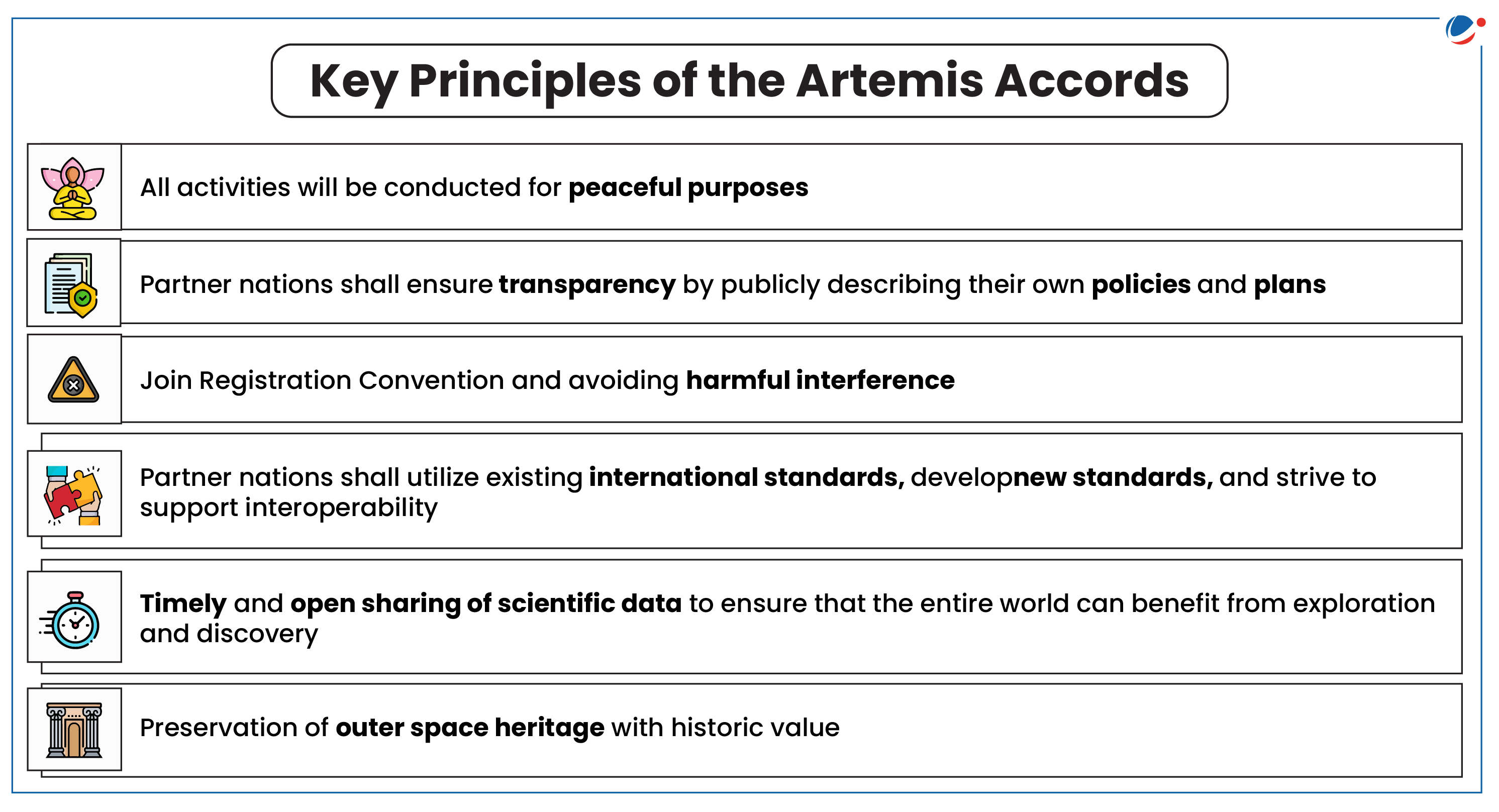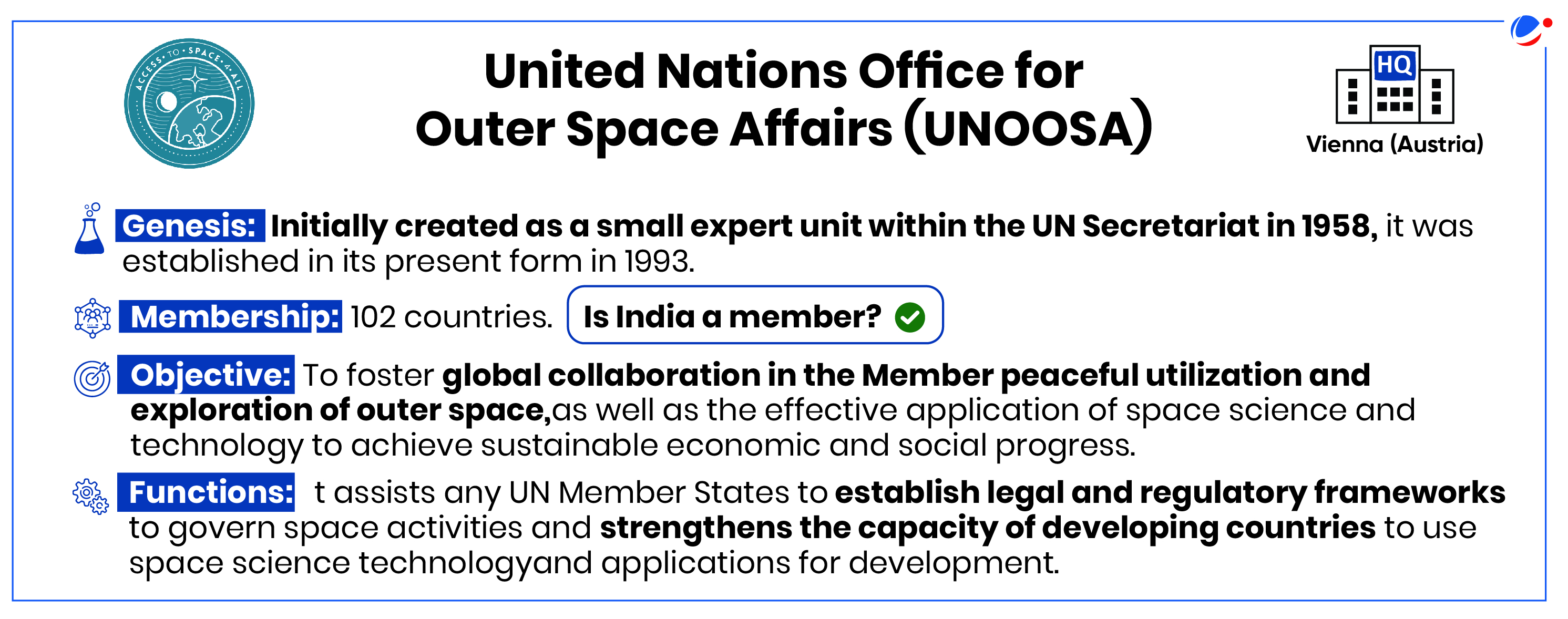Why in the News?
Armenia has joined as the 43rd signatory nation to NASA's Artemis Accords for lunar exploration.
About Artemis Accords
- Established: In 2020 by NASA, in coordination with the US Department of State, together with seven other founding member nations (Australia, Canada, Italy, Japan, Luxembourg, UAE, and UK).
- Grounded in the Outer Space Treaty of 1967 and other agreements including the Registration Convention, the Rescue and Return Agreement.
- Objective: It sets common non-binding principles to govern civil exploration and use of outer space, the moon, Mars, comets, and asteroids, for peaceful purposes.
- Aims to promote Peaceful, sustainable, and transparent cooperation in space.
- India is also a signatory to this Accord.

Existing Outer Space Governance Framework
- In 1958, the United Nations General Assembly (UNGA) established the Committee on the Peaceful Uses of Outer Space (UN COPUOS) to govern the exploration and use of space for the benefit of all humanity.
- The UN COPUOS has been supported in its work by the United Nations Office for Outer Space Affairs (UNOOSA).
- Key International Space Treaties:
- Outer Space Treaty 1967: Treaty on Principles Governing the Activities of States in the Exploration and Use of Outer Space, Including the Moon and Other Celestial Bodies.
- Rescue Agreement 1968: Agreement on the Rescue of Astronauts, the Return of Astronauts, and the Return of Objects Launched into Outer Space.
- Liability Convention 1972: Convention on International Liability for Damage Caused by Space Objects.
- Registration Convention 1976: Convention on Registration of Objects Launched into Outer Space.
- Moon Agreement 1979: Agreement Governing the Activities of States on the Moon and Other Celestial Bodies.
- India is a signatory to all five of these treaties but has ratified only four. India has not ratified the Moon agreement.

Need for Reform in Outer Space Governance
- Space debris: It is a challenge that will be compounded by the large number of satellites being launched into low Earth orbit. According to ESA estimates, there are 130 million space debris objects from greater than 1 mm to 1 cm.
- There is not at present an international mechanism or body to monitor space debris or facilitate its removal.
- Resource activities: There is not an agreed international framework on space resource exploration, exploitation, and utilization, or a mechanism to support its future implementation.
- Space mining will be one of the major focus areas of commercial space activity in the coming decades.
- Space traffic coordination: At present, national and regional entities coordinate space traffic with different sets of standards, best practices, definitions, languages, and modes of interoperability.
- This relative lack of coordination widens the gap for countries with less space capacity, making it harder for them to operate their limited space assets in an increasingly complex environment.
- Prevention of conflict in outer space: Additional normative frameworks are needed to prevent any extension of armed conflict into outer space and to prevent the weaponization of outer space.
- A major challenge in space security is the dual-use nature of many capabilities. Any satellite capable of maneuvering can destroy other satellites.
- Increase in the number of satellite launches: There has been an exponential increase in satellite launches over the past decade, driven by both government and private sector participation.
- For instance, number of satellites have been increasing at 30% on average every year (As of 2020).
What role can India play in improving Outer Space Governance?
|
Way Forward
United Nations in its policy brief document titled 'For All Humanity – the Future of Outer Space Governance' recommended:
- New treaty for peace and security: The UN recommends the negotiation and development of a new treaty to ensure peace, security, and the prevention of an arms race in outer space.
- Space debris removal: Develop norms and principles for space debris removal that takes into account the legal and scientific aspects of space debris removal.
- Space traffic management: Develop an effective framework for the coordination of space situational awareness, space object maneuvers, and space objects and events.
- Space resource activities: Develop an effective framework for sustainable exploration, exploitation, and utilization of the Moon and other celestial bodies.
- This framework could include binding and non-legally binding aspects and should build upon the five United Nations treaties on outer space.
- Inclusiveness: Member States to consider how to facilitate the participation of commercial actors, civil society representatives, and other relevant actors in the work of outer space-related intergovernmental processes.




